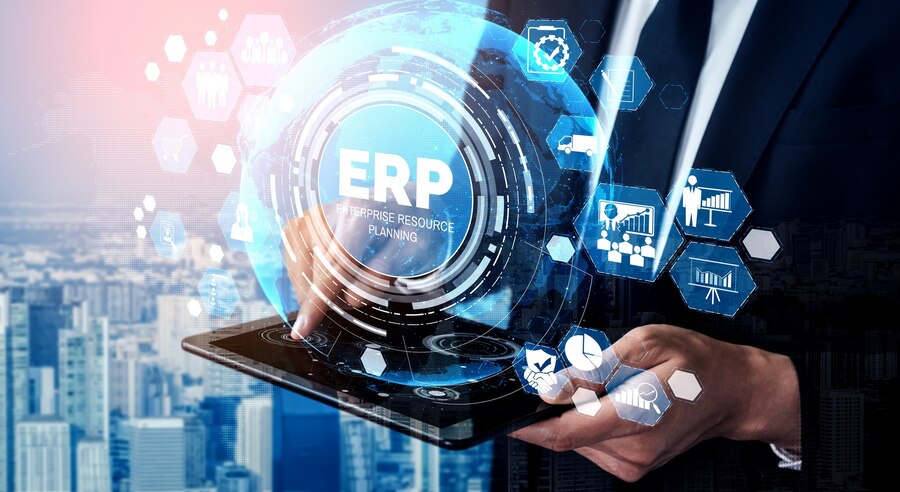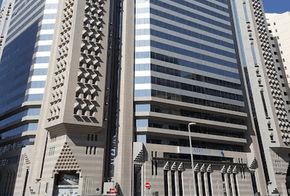ERP Software in the UAE: Enhances Business Operations
- November 30, 2023
- Posted by: Velosi Author
- Categories: ERP, Insights, Software

ERP Software is required in the UAE to integrate and streamline business operations. Furthermore, Using ERP Solutions in the UAE can give businesses a competitive edge against the local and international market. Let us explore how ERP software in the UAE boosts business operations.
What is ERP (Enterprise Resource Planning) Software
ERP is a software that manages core business processes in an organization. It allows companies to collect, store, manage, and interpret data from various business activities and departments, allowing for better decision-making and operational efficiency.
Why ERP software in the UAE?
The UAE is a vibrant business hub with a range of industries from finance to oil and gas. There are many different types of businesses that have multiple. Moreover, they all require effective management and optimization of their processes. This is where ERP comes into play.
The Following 13 Benefits Portray How ERP software and ERP Solutions are great choices for businesses in the UAE.
- Efficient Reporting and Analytics: ERP systems offer robust reporting and analytics tools, making it easier to monitor KPIs, generate reports, and gain insights into your business’s performance.
- Regulatory Compliance: Various industries in the UAE are subject to many strict regulatory requirements. ERP software helps businesses maintain accurate records and automate reporting, ensuring compliance.
- Real-time Data: ERP systems enable businesses to make fast, concise, and informed decisions regarding the constant changes in market conditions.
- Cost Savings: ERP integration decreases operational inefficiencies to a minimum and in the long run ERP software can lead to drastic cost savings.
- Enhanced Collaboration: ERP solutions promote better collaboration among different departments by providing access to shared data and facilitating communication. This reduces information silos and fosters teamwork.
- Scalability: ERP solutions can grow with your business. As your organization expands, you can add new modules or features to meet evolving needs.
- Inventory Management: ERP systems help optimize inventory levels, reduce stockouts, and minimize excess stock, which can save businesses money and improve customer satisfaction.
- Quality and Consistency: ERP systems can enforce standardized processes and quality control, ensuring that products and services meet consistent standards.
- Mobility: Many modern ERP solutions offer mobile access, allowing employees to access information and perform tasks remotely, which is especially valuable for businesses with remote or field-based workers.
- Competitive Advantage: By increasing efficiency and providing better insights, ERP systems give businesses a competitive edge in the market.
- Customer Insights: The integration of customer data in ERP systems enables businesses to gain a deeper understanding of customer behavior and preferences, helping in tailoring products and services.
- Supply Chain Optimization: ERP systems can improve supply chain management, leading to more efficient procurement, reduced lead times, and cost savings.
- Flexibility: ERP solutions are highly customizable, allowing businesses to adapt the software to their specific needs and industry requirements.
How can ERP Solution be implemented in the UAE?
The ERP can help streamline operations, so businesses can use it across departments.
- Finance and Accounting: ERP systems handle financial transactions, budgeting, accounts payable and receivable, and financial reporting.
- Human Resources: They manage employee information, payroll, attendance, recruitment, and performance evaluation.
- Supply Chain Management: ERP software helps with inventory management, order processing, procurement, and logistics.
- Sales and Marketing: It assists in managing customer information, sales orders, and marketing campaigns.
- Manufacturing and Production: ERP systems provide tools for production planning, quality control, and resource allocation.
- Customer Relationship Management (CRM): Some ERP systems include CRM modules to manage customer data, sales, and support processes.
- Project Management: They offer project tracking, resource allocation, and progress monitoring capabilities.
- Inventory Management: ERP systems help in tracking and managing inventory levels, reducing stock outs, and minimizing excess stock.
- Business Intelligence and Reporting: They provide tools for data analysis, reporting, and generating insights from the accumulated data.
Conclusion
To conclude, ERP software is a powerful tool in the United Arab Emirates (UAE) for enhancing business operations across various sectors. It streamlines processes, centralizes data, improves decision-making, and fosters collaboration, making it indispensable for UAE businesses in a dynamic and highly competitive business environment.
By implementing efficient ERP software, UAE businesses can achieve greater operational efficiency, reduce costs, ensure compliance, and gain a competitive edge. The scalability and flexibility of ERP solutions allow them to adapt to the evolving needs of organizations, whether large or small. As the UAE continues to flourish as a business hub, ERP software plays a crucial role in helping businesses not only survive but thrive in this highly competitive environment. By leveraging ERP systems, companies can position themselves for success, drive growth, and meet the ever-changing demands of the UAE’s business landscape. It’s a strategic investment that can propel businesses to new heights of productivity and profitability.
Please contact us for more information and assistance.


